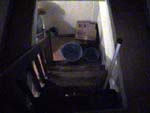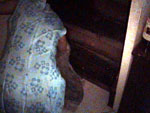21 August 2003 | 1100H | Valenzuela
Hydrophobia: Vignettes on Valenzuela
Text by: Jewel Castro | Photos by: Jen Culian
 The word the broadcasters used was "sinalanta." Ergo:
"Sinalanta kami ng bagyo." Or: "Sinalanta ng bagyo ang
buhay ko." "Sinasalanta ng bagyo ang buhay ko."
The word the broadcasters used was "sinalanta." Ergo:
"Sinalanta kami ng bagyo." Or: "Sinalanta ng bagyo ang
buhay ko." "Sinasalanta ng bagyo ang buhay ko."
Am I exaggerating? We are submerged like a funny
little city with amphibious houses. We might as well
grow scales all over our calves and webs of scaly skin
between our toes. Ever since I could remember, rainy
days always brought water into the house. It is only
the volume and color of the water that changes with
time.
THE BALSA
Some people think it is kind of quaint or cute that we
have little rafts to get us across the deep flood. Men
from the squatters' area would construct these
balsas and push them against the strong
current. Ten pesos per passenger. Four passengers
maximum. Sometimes I myself think it is funny. I had
almost burst into laughter the first time I rode the
floating plywood-styrofoam-plastic-bottles
contraption. Clad in my high school uniform, I sat on
a wobbly plastic chair as I was paraded like the
Penafrancia along our street. There was even one
instance when I rode a discarded refrigerator with a
cute little chair inside of it.
MAKING LUSONG
However, it really is not that funny when there are no
rafts and you have to wade across knee-deep and
sometimes waist-deep ice-cold water that has dissolved
all of the village's sewage, industrial waste and
household garbage. My friends have not experienced
having shit floating all around them and they just
laugh at my stories. It is also not funny when you
contact Leptospirosis, a fatal disease that you get
when rat piss enters an open wound.
I remember Jeannette Winterson's "The Passion," where
Venetian boatmen have webbed feet and could walk on
water. I want that.
THE HYDROPHOBIC HOUSE
The house looks very much different now from the way
it looked forty years ago. About two storeys are
buried beneath our first floor. It all started with a
bungalow. Then they had to build a second floor. Then
the second floor became the first floor. And so on.

It has always been like this: The flood comes in and
we haul our stuff upstairs and onto benches and thick
planks of wood attached to the wall. We always try to
be prepared, but there is always that crucial thing
that gets left on the floor and we only notice it when
the tide is starting to rise. The last time it was the
washing machine. It was very heavy, and I can only
wonder how my Lola and I had managed to lift it with
our bare hands. I had not taken a bath for two days
and I felt sticky and my toes were wet from the
curious annoying moisture inside the rubber boots I
wore while I helped with the evacuation.
I wonder how much longer our family could stand living
here. I wonder if the cycle would go on yet again for
another year -- although it probably would, given our
finances. We are not so poor, we could afford to eat
heartily more than thrice a day and all my siblings
and I still go to school and we have cellphones. But
whenever it rains, whenever I could not go to school
because of the flood and whenever my toes feel the
almost-rotting wood of the last three steps of our
staircase soaked overnight in filthy water, I feel
poor. I feel wretched and trapped and outraged that
something could be done -- we could move to another
place -- yet we are doing nothing. We vow to go away
once and for all as we watch the flood seep from
cracks in corners, creeping up our stairs. As the
waters start to rush into the windows, we promise to
ourselves and to each other that, next summer, we
would find a new home.
But it has always been like this. Summer comes and
once more we feel safe and we start putting things
closer to the ground. The tables are back on the floor
and everything else seems to have lost their
hydrophobia. We change our minds about leaving. We are
fine.
But then again, really, we are fine.
There is a curious thing that happens when the family
is stuck together. Mama says that she loves the rain
as she combs my long hair. We laugh heartily at not
being able to go to the bathroom. We talk. We eat
together -- something that rarely happens on ordinary
days. We all lie down in one bed and cuddle close to
each other -- malamig e.
Sometimes I wonder if the apocalypse would be like
this -- a great storm, another great flood. Whenever
the tide rises is a time for cleansing. I suppose I
have grown accustomed to the ways of Valenzuela,
because, believe me, I would not live anywhere else.
I'm happy here. I guess I need to be in contact with
the piss and shit of the world I live in: there is no
other way of understanding it better.
